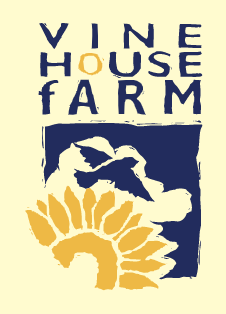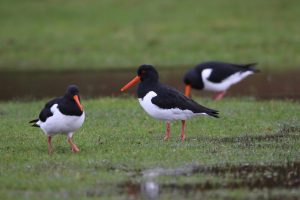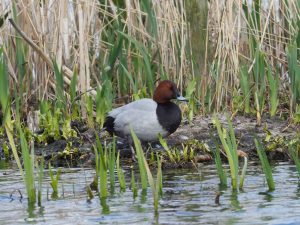
October has been wetter than average with 66mm of rain here, the October average here being 48mm. It has also been warmer than average 12.3°C, only six warmer Octobers and they have all occurred in the past 25 years. Winds have generally been light but on the last day of the month we had winds gusting to over 70mph, bringing down trees and stopping the turbines – something that only happens once every two or three years.

For a change, October has been a kind month to us, October 2019 and 2020 were shocking months, both with 4ins of rain. We were doing things on the farm when the soil was really too wet, but our modern machinery, potato harvesters and 4-wheel drive tractors, are able to work in atrocious conditions, but at the same time allow us to punish the soil. Power harrows also allow us to make a seedbed when it is really too wet, so that we can cover the seed with our modern corn drills, but they are also punishing the soils. A dry year goes some way to repairing the soil, but it doesn’t get back to how it should be, because over the many years of cultivation and sprays, we have killed most of the insects that used to live in the soil.
There are thousands of people working to help farmers grow bigger crops but really it’s not to help farmers – it’s all about making money for themselves. However, every year new varieties of wheat, barley and other crops are introduced which may yield 4-5% more than the previous best yielding variety. If all of these yield increases were added up, our crops of wheat would be yielding 10 tonnes per acre instead of the four to five tonnes per acre that we currently grow. That is because we keep punishing the soil and killing off the insects that are really responsible for keeping our soils in good condition.
Our soils could be repaired by sowing them with grass, then have them grazed by sheep and cattle. The ideal scenario would be to have four years grass and four years cultivation. However, we make more money out of growing crops than we do out of animals and producing milk. If every farmer did bring animals back on the farm, there really would be a surplus of meat and milk. Prices would drop even further, and dairy farmers are already selling their milking cows because they can’t make it pay, partly because they are being squeezed by the supermarkets. You could say that those farmers who are still milking cows have a milk factory, the cows are being pushed to their limits.
Vegetable farmers are also being squeezed by the supermarkets. Every year some farmers stop growing vegetables because they can’t make it pay, leaving it to the large firms that still can, mainly because of the thousands of acres that they grow, their margins are very slim.
We were able to put the combine away on October 16th when we finished harvesting the sunflowers. Quite a good crop, yielding about one tonne per acre, which is now drying in our grain store. Before that it was the red millet, which didn’t yield very well because it was bashed about by the wind. Millet is not very weather hardy, it soon starts to shed and lays down in the wind and the rain. Potato lifting hasn’t finished yet, we stopped lifting as the soil was too dry in our last field.


October is not a month when I expect to see many birds on the farm, our summer visitors have left and the bulk of our winter visitors arrive in November. It does depend on the weather in Scandinavia and eastern Europe, not just the temperature but also the wind. If the winds are continually blowing from the south west the birds do not fly across the North Sea. They keep going south through Denmark, Holland, Belgium and France, and the UK gets even less of them. All birds have a very good memory for food sources; I might not have seen any Fieldfares by the end of October, but there could be plenty of them in the apple orchards of Herefordshire. The birds will have flown through the night to where they had plenty of food the previous year.
I haven’t met anyone who has seen a Fieldfare in South Lincolnshire yet this autumn, but we have seen several Redwings. When I visited Herefordshire on October 28th there were plenty of Redwings around. Fieldfares do not breed in Iceland, but Redwings do. Around the middle of the month, we had several days of north-westerly winds when Whooper Swans arrived from Iceland, so I am thinking that the Redwings we have are also from Iceland. It could be that there is a good berry year in Scandinavia, or it could be that there haven’t been any suitable winds for them to cross the North Sea.
In general, species don’t go any further than they need to and some species we might think are declining because we see less of them, have not bothered to cross the North Sea. The Smew, for example, is a duck that breeds in the Arctic and used to be quite common on the gravel pits in Langtoft and Baston Fen.
Not all our winter visitors come from the North West; ducks, geese, waders, swans and passerines also come from Iceland, Greenland and Arctic Canada. We’ve had several days of north-westerly winds this Autumn, so birds coming from those areas are here in good numbers: Redwings, Whooper Swans and Pink Footed Geese. The smaller birds seem to spread all over, but geese and swans go to particular localities. The Brent Geese from Siberia come to the East and South coasts of England, while those that come from Arctic Canada and Greenland stay on our west coasts.
Most of our winter visitors are not in trouble, as their numbers are generally fairly stable. Unfortunately more than half of our summer visitor species are declining, some from what we are doing in this country by destroying their habitat and some of them from what is happening in Africa.
The human population in Africa has quadrupled since WW2 and so there has been a massive destruction of habitat which has affected all forms of wildlife. However, in the Arctic man hasn’t had a large impact on the habitat in general, and so our winter visitors continue to visit us in good numbers and thrive here eating berries and grass. It is the insects that are declining here and that is causing our summer visitors to rear less young and so decline.
Ploughing Winner!
My 16 year old grandson, Tim, entered the Deepings’ ploughing match on October 30th with around 70 other competitors, and he won the under 21 category! He has a 1973 Leyland tractor with a two furrow plough.



